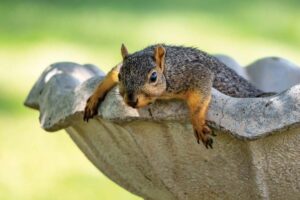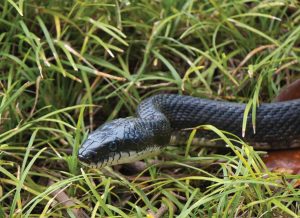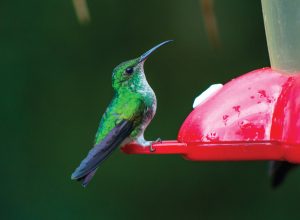When traveling last fall, I came across two large birds dining on roadkill just off a county road. At first, I thought they were common turkey vultures, but as I got closer, I quickly identified them.
They were black and appeared to have less of a protruding tail than a turkey vulture and were more plump in stature; rather than bald and flesh colored heads, their heads were feathered and black.
They were black vultures. In the past, I have encountered them along the Ohio River and in southern Indiana, but their range into central Illinois is expanding. The black vulture (Coragyps atratus) is a member of the New World vulture family and can be found between the northeastern and southern United States.
Black vultures have a dark gray head and should not be confused with their larger, less aggressive and red-headed relative found throughout Illinois, the turkey vulture. Black vultures live in southern regions but are expanding their range farther north, creating depredation problems for farmers.
Like their cousin, black vultures predominately feed on carrion. But this is where their common traits end. While turkey vultures are not aggressive, black vultures are known to gang up and prey on calves being birthed, piglets, lambs and newborn goats. They sometimes attack vulnerable or ill cows. They can be a nightmare for livestock farmers.
According to the Cornell Lab, it’s not just farm livestock in danger. Household pets may be at risk, too. Wayne Long, the Jefferson County extension agent for the University of Kentucky College of Agriculture, Food and Environment, said small pets like cats and dogs may be at risk of attack just by nature of being small animals.
Until now, livestock owners’ only recourse was to house their livestock where they are protected from the black vultures. Previously, harming the birds was out of the question since black vultures are protected under the federal Migratory Bird Treaty Act of 1918. Under the act, it is illegal to harm, harass or take (kill) black vultures without a permit.
Last year, the Illinois Farm Bureau (IFB) obtained a statewide depredation permit for black vultures from the U.S. Fish and Wildlife Service. IFB will work with USDA Wildlife Services to issue federal sub-permits to livestock farmers who are experiencing issues with black vultures on their land. IFB will also work with the Illinois Department of Natural Resources (IDNR) to secure the necessary state permits for farmers seeking approval.
“In an effort to speed up the process and reduce application costs, IFB will hold the federal depredation permit for livestock farmers facing problems resulting from black vultures,” said IFB President Richard Guebert. “This process will also help farmers quickly receive a state permit from IDNR. We are hopeful that this effort will help reduce conflict between the black vulture population and livestock production.”
If black vultures are presenting a threat to livestock or pets, contact the IFB, IDNR or your local conservation officer for advice.










